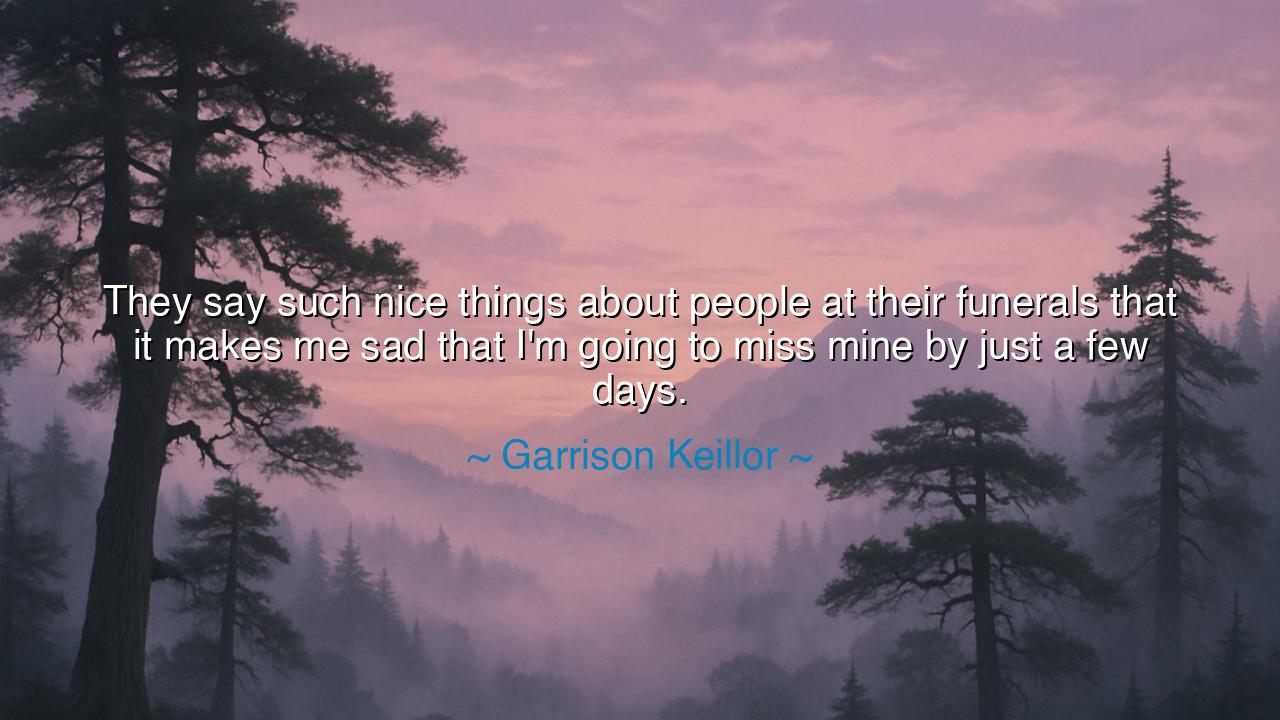
They say such nice things about people at their funerals that it
They say such nice things about people at their funerals that it makes me sad that I'm going to miss mine by just a few days.






In the words of the storyteller Garrison Keillor, we hear a bittersweet truth: "They say such nice things about people at their funerals that it makes me sad that I'm going to miss mine by just a few days." This saying, spoken with gentle humor, is not merely about laughter but about the fragile longing of the human heart. For in this brief jest lies a deep lament—that we often speak our greatest praises only when ears can no longer hear them, and when hearts that once longed for love can no longer be comforted. It is the sorrow of praise delayed, the tragedy of affection unspoken until silence reigns.
The origin of such a thought lies in the ancient yearning for recognition and remembrance. The ancients themselves knew this well. The Greeks inscribed epitaphs upon stone, telling of the valor of warriors, the tenderness of mothers, the wisdom of statesmen. Yet those words, though carved into eternity, were never heard by the ones who most deserved them. Keillor’s voice, though born in modern times, echoes the lament of countless generations: Why must the flowers be laid upon the coffin, when they might have brightened the days of the living?
Consider the tale of Diogenes the Cynic, who, when asked how he wished to be buried, replied that he wished his body to be tossed outside the city walls, that beasts might devour it. When people were horrified, he asked, “Why should I care for what happens when I no longer live to feel it?” His words are sharp and unyielding, yet hidden within is the same truth Keillor reveals with gentleness: what use are honors and ceremonies to those who are gone? Far better it would be to give honor, gratitude, and kind words to the living soul, rather than to the lifeless shell.
Or recall the example of Abraham Lincoln, who, though deeply misunderstood in his time and weighed down by criticism, was exalted only after death as a martyr and a liberator. In his lifetime, he bore insult and political strife. But when the final shot rang out in Ford’s Theatre, the people suddenly saw him with new eyes, as if his death had unsealed their tongues. They spoke of him as the great savior of the nation, their father, their hero. How much lighter might his burdens have been if such words had been spoken while he yet breathed?
The lesson, then, is clear: speak now, while voices may still be heard. Praise not the stone that marks the grave but the soul that walks beside you. Do not wait until death to honor the kindness of a friend, the courage of a mother, the wisdom of a mentor. Life is short, and the ears that yearn for your gratitude will not remain open forever. To hold back your words of love is to risk the silence of regret.
Therefore, let every man and woman make it their practice to celebrate the living. Speak kindly to your brother, and do not wait for the priest to speak over his coffin. Tell your friend you are proud of them, before the choir sings their requiem. Write letters of appreciation, give thanks in daily life, and pour out words of encouragement while breath still warms the flesh. These are the offerings that matter, the sacrifices that heal wounds and strengthen hearts.
Remember, too, that such words need not be grand or adorned in poetry. Even the simplest truth—“I love you,” “I am grateful for you,” “Your life has touched mine”—is more precious than a thousand lofty eulogies spoken too late. Let us not be like those who save their gold until the temple crumbles; let us scatter it freely while the temple yet stands.
And so, let Keillor’s jest become for us a guiding torch. Do not withhold your praise until the grave, for there, no man may hear it. Instead, weave a garland of words today, place it upon the brow of the living, and rejoice in the light it brings to their eyes. This is the way of wisdom, the path of compassion, the legacy that outlives even the funeral song.






AAdministratorAdministrator
Welcome, honored guests. Please leave a comment, we will respond soon